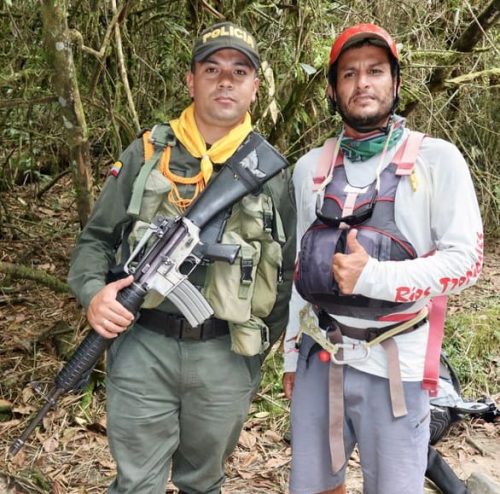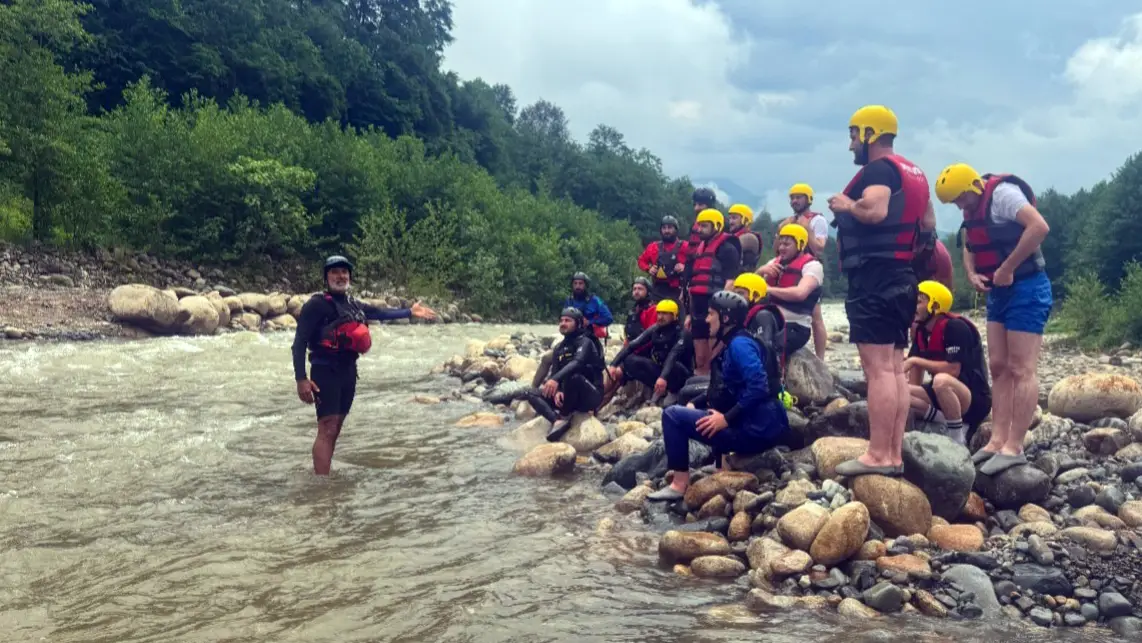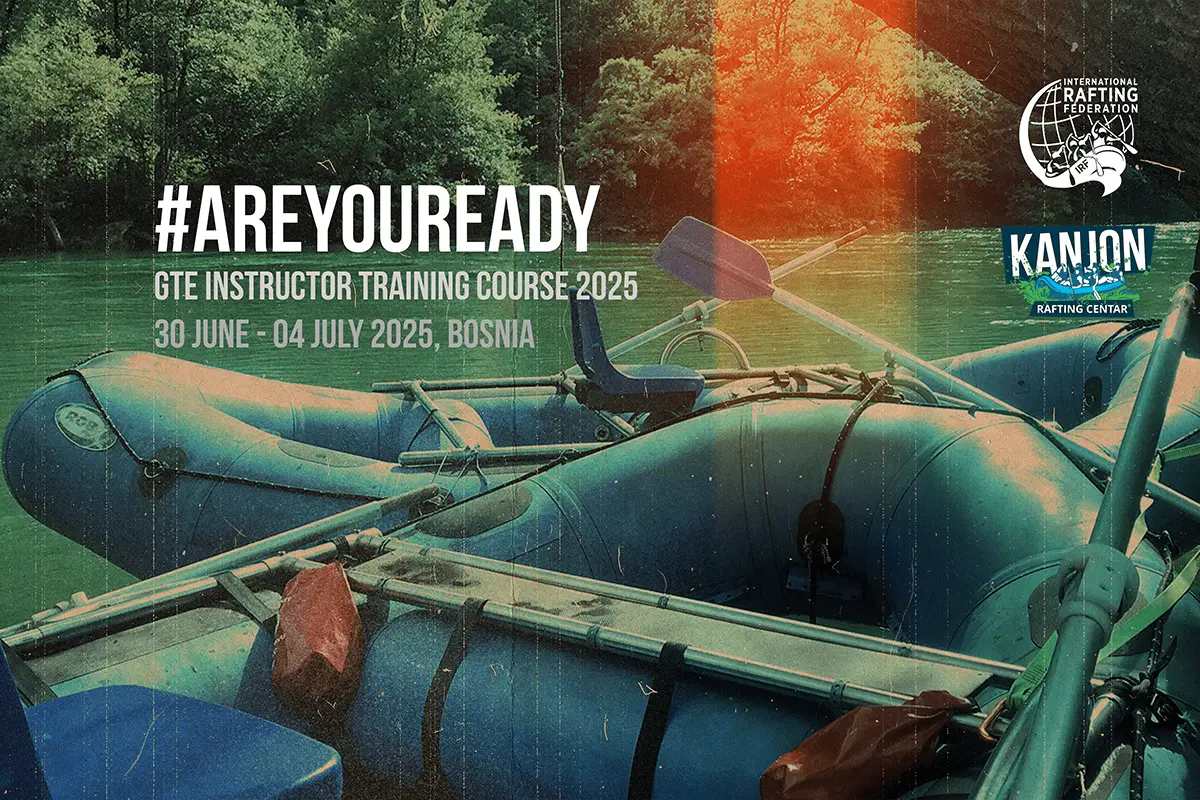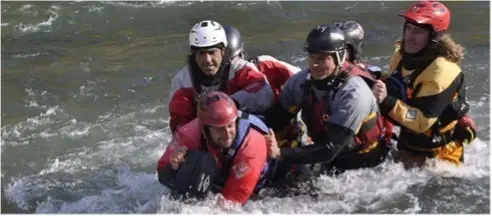
A Costa Rican rafting mission led by the company Rios Tropicales and the United Nations traveled to Colombia to meet with a group of ex-guerrillas from the FARC. Teaching them to tame the rapids of the Pato River, in complete peace, was the reason for the singular adventure.
It’s a quiet and a particularly cool night. A pair of crickets hum through the bushes and the river roars imposingly through the mountains. All is good without bullets, all is good without anyone dead. It is a quiet evening in the heart of the Caquetá jungle, a Colombian territory traditionally dominated by the Revolutionary Armed Forces of Colombia (known by the Spanish acronym FARC).
Suddenly, a peasant voice sharply cuts the calm and from the first strum of his guitar to a group of Costa Ricans, waiting quietly and expectantly, their soul breaks… “… Today I tell you, brother, I no longer shoot, for the peace of my country, I left my good rifle … Already the bombers cannot be heard coming and the noises at night let me sleep … I am well accommodated, I smile and even talk to soldiers (military) … And my family knows about me …”
Before a softened and “goosebumped” audience, this is how young Freyi sings it. His musical confession portrays his stormy past, but above all, his hopeful present. Freyi is no longer a guerrilla; now he is a powerful rafting guide.
In October 2018, an expedition from the Costa Rican rafting company Rios Tropicales accepted the invitation of the United Nations to visit a disarmed Colombian territory. Without prejudice, but with the expectation of what could happen in assuming such a unique challenge, rafting experts went into the once feared mountainous region, lived with the ex-combatants of the area, and even established close friendships.
Help them exchange rifles for paddles – that was the noble objective.
“For me, all this began around 1995, when I visited Colombia with the idea of opening rafting routes over there. I was in the area of Bucaramanga and we got several companies operating. However, we could not enter many other areas because the FARC guerrillas were at their peak in those parts; it was very dangerous,” said Rafael Gallo, CEO of Rios Tropicales. “I stayed with the idea, because knowing the Colombian geography, I knew there were about 100 rivers to explore. But you just couldn’t,” he added.

For that reason, when the UN knocked on his door in August 2018, he did not hesitate to take on the singular challenge. Gallo was invited to advise a training process on the Pato River, where in the midst of an ecotourism project, a group of ex-guerrillas wanted to become masters of the rapids.
After the peace accords were signed, renegotiated and signed again in 2016 between the Colombian government and the FARC, reintegrating the guerrillas into society has become a monumental challenge. Drawing on creativity is imperative in these efforts and it is clear that the beautiful river – of category 3 and 4 rapids – could not be missed.
“For me, it’s very symbolic, because rafting is an activity where it does not matter what your religion, race, political or ideological beliefs are. In the river, on the raft, we all must paddle together and without distinctions to run a rapid,” said Gallo.
Inspired by these values, Gallo packed suitcases in August and took a plane to the city of Bogotá, then headed to Villavicencio. He finally boarded a helicopter that took him to San Vicente del Caguán, in Caquetá, the land where Manuel Marulanda Velez “Tirofijo” – one of the best known and strongest leaders of the FARC – walked for a long time. “I was wondering what the camp would be like and how people would react when they saw me. But there was no fear,” recalled the businessman.

At Camp Miravalle – the name of the place where the rafting project is hosted – Gallo remembers that at first, he came across people who were a little shy; but little by little, they showed their most friendly side. He felt very good in the area, although he quickly became very worried: in the two days that the businessman supervised the rafting project, he noticed that the training they were giving to the ex-combatants was really deficient.
“It was a training joke. They were not teaching them anything,” said Gallo. Distressed, Gallo not only informed the UN representatives of the precarious situation but offered two of his best men to go save the noble project: Roy Obando and Max Solano, Costa Rican guides with more than 20 years of experience in the wildest rivers of our country.
“They are quality instructors, certified by the International Rafting Federation. When I returned to Costa Rica, I made the offer and they accepted without hesitation. They were very touched. By air and by land they traveled to Caquetá and this is how this adventure began, a beautiful adventure for us,” he explained. With the expert Tico team in Colombia, and the adrenaline of the ex-revolutionaries at its peak, the time to overcome the rapids had arrived. Paddle by paddle, for the peaceful conquest of the Pato River.
Conquering the rapids
“Everything we are now we owe to Costa Rica,” comments Duberney Moreno, one of the former guerrillas enrolled in the rafting project. Duberney, who joined the FARC when he was 18, now proudly wears his credentials as a certified guide and dreams of a future that was previously blurred.
In the FARC, many of the ex-combatants confess that, before, they did not have many expectations of life. To live past 40 years in conditions of war was already an important accomplishment, because the natural thing was to die being shot or to die of some disease in the middle of the solitary mountains. Duberney, for example, took risks like no other. As in the past, there were no cellphones and communications in the mountains were difficult. The ex-guerrilla was a kind of human mail. If the boss needed to say something to someone outside the camp, Duberney left with the message on his own, taking days and even months until the recipient received the message.

In addition, Duberney was an explosives expert, as they called those in the FARC who manufactured and transported explosives to different guerrilla bases. “In that sense, one of them told me something that touched me a lot: ‘Now, I dream of being a grandfather – that keeps me alive and that is what most excites me about peace.” Gallo recalled.
Duberney does not have children yet, but he knows they could arrive soon. He dreams that the rafting company will start to be profitable and that tourists from all over the world will lose their fear of their mountains, their faces and their pasts. And apparently, it’s not that difficult. Max Solano, one of the Tico guides who shared a raft and paddling with the ex-combatants for a month and a half, assures that knowing them was a lovely experience. “We accepted the project because helping peace was something exciting and meaningful for us. In addition, we were never afraid because the UN protected the project and we had guarantees,” said Solano.
Solano remembers that, at the beginning, Duberney and all the others were serious and silent in his presence; but that after a couple of days, the ice was magically breaking. “We began to establish a sincere friendship. They were very kind and humble with us. It struck me that the first talks we had were about Costa Rica and its peace. They wanted to know how we lived that way, since they were incredibly afraid of living like this,” he added.

For the ex-combatants, it was simply inconceivable to think that Costa Rica had no army. How was that? Roberto Gallo, Rafael Gallo’s son, witnessed that feeling the day he saw a Colombian military patrolling along the Pato River, near the place where the rafting ends. “My son is 23 years old and, of course, he got scared a bit when he saw the soldier, fully armed at that place. Only the presence intimidated him a little. In front of the former guerrillas, he commented that it was not common to see that in Costa Rica because there were no Armed Forces,” said Gallo. “They immediately were in awe. They could not understand that reality in their heads,” the businessman added.
Additionally, in other times, if an ex-guerrilla and a Colombian military man saw each other on the banks of a river it would not have been anything pleasant. But this is no longer the case. What would normally have ended in a deadly shooting, ends now with a handshake, a smile and even a joke. “There are still several police and military officers who see something wrong, they have certain resentments, but the truth is that most of us get along well. There is friendship and everything,” confesses Duberney, who exercises a very positive leadership at Camp Miravalle. “It’s very nice; it’s like a feeling of reconciliation. We have already played football matches together and we have taken some of the military and the police down the river by raft. We get along pretty well,” he adds.

During the practices in the river, where the apprentices became experts in the business of the rapids, the stories ran from one side to the other. They were not afraid at all to talk about their troubled past and the Ticos loved to portray what the world was like outside the jungle. For example, the Colombians told the Ticos about the custom of having dinner early, even long before the sun went down. It was important to do so, lest the lights of the fire or flashlights make them visible to military radars.
In addition, they told about the pain of losing their friends in combat, the anxiety they lived after hearing strange noises at night, and the scare they had the day a military helicopter landed in the vicinity of the camp. The shooting and death, inevitably, were present that unforgettable day.
“Everything was very painful, very complicated. No more war for me, no more weapons,” said Duberney.
Paddling a passage to heaven
According to Max, the desire of the ex-combatants to triumph was admirable. The determination they showed on the raft, when the rapids hit the boat hard or the raging currents sent a companion into the water, was fascinating.
They behaved like strong oaks in the river, passionate guys. Remembering that many of them didn’t know anything more than weapons as a method of survival could explain everything. Several ex-combatants did not know how to write when they were recruited into the revolutionary ranks, and others maybe only managed to finish elementary school. The world was small for them and now a paddle made them reach for the heavens. “They learned everything that is required to run rivers and guide tourists. They were very methodical in their performance and always worked as a team. In a month and a half, thanks to their determination, they learned what a Tico does in six months. Their spirit to learn, to be different, was impressive,” said Max.

For them, rafting is like everything or nothing. Better paddling, than fighting. Rafael Gallo sums it up like this: “With rafting, the world opened incredibly. The day I returned to Caquetá to give them their credentials as guides, I saw in their eyes a special shine, a confidence that I never saw, it was inspiring.”
Now, the ex-guerrillas live in a small community. What they produce in San Vicente del Caguán they share among all to survive. Many of them still believe in Colombia’s social change, but now they cling to political efforts, rather than armed force.
“You have to remember that they are the result of something they did not generate. They did not ask to be guerrillas, to be in that situation and conditions. That’s why rafting represents a great opportunity for their lives,” said Gabriel Bolaños, a Costa Rican businessman who donated money from his pocket for the Rios Tropicales mission.
“Many of them were recruited at age 12. They had Russian agents who prepared them in war tactics and a French agent who formed them in ideology. So, they grew up among extreme violence; and yet, you talk to them and they are human beings like any other, calm and close. It’s very nice to have met them,” Bolaños added.
If cocaine was trafficked, there were deadly confrontations and painful kidnappings, which now is not apparent. For Bolaños, now only hope is breathed. “It is very symbolic that Costa Rica has contributed to this project, to be the sponsor. I believe in peace and I believe that this way of living, in which we have all grown up, has great value and we can serve as mediators,” he concluded.
A world-class dream
The day in November 2018 that Rafael Gallo traveled returning to Colombia to graduate the ex-guerillas as new rafting guides, he knew that these men need “a dream” in their lives. Their eyes shone and that passion could not be quenched. That is why Gallo took the floor and spoke some words that still resonate in the hearts of the group of Colombians.
“You are invited to participate in the World Rafting Championship. In May 2019, we will make efforts for you to participate under the flag of peace in Australia,” proclaimed Gallo.

That day, Camp Miravalle rumbled with the news. Excited, the ex-combatants have not stopped training to realize the great adventure of their lives. “This is something incredible for us. We have never left the country, or anything close to that. I cannot explain the thrill,” Duberney said.
From Costa Rica, as expected, this new initiative is being led. Guides Max and Roy direct the training process remotely, and volunteers like Gabriel Bolaños look for the necessary funds to finance the trip. “It’s an incredible opportunity. It will give them exposure all over the world. They will leave the jungle and they will know a higher level. We will accompany them there,” said Gallo. “They are training hard. Hopeful. It is really moving,” concluded the businessman.
So, watch out world, because Camp Miravalle ‘has raised its paddles’.
Original post: www.nacion.com/viva/cine/ticos-y-exguerrilleros-de-las-farc-el-arte-de/H2JANDJNR5EWVESKMS3JJSTTSI/story
#AreYouReady #RaftersAreAwesome #StrongerTogether #RiverFamily #WeAreIRF





